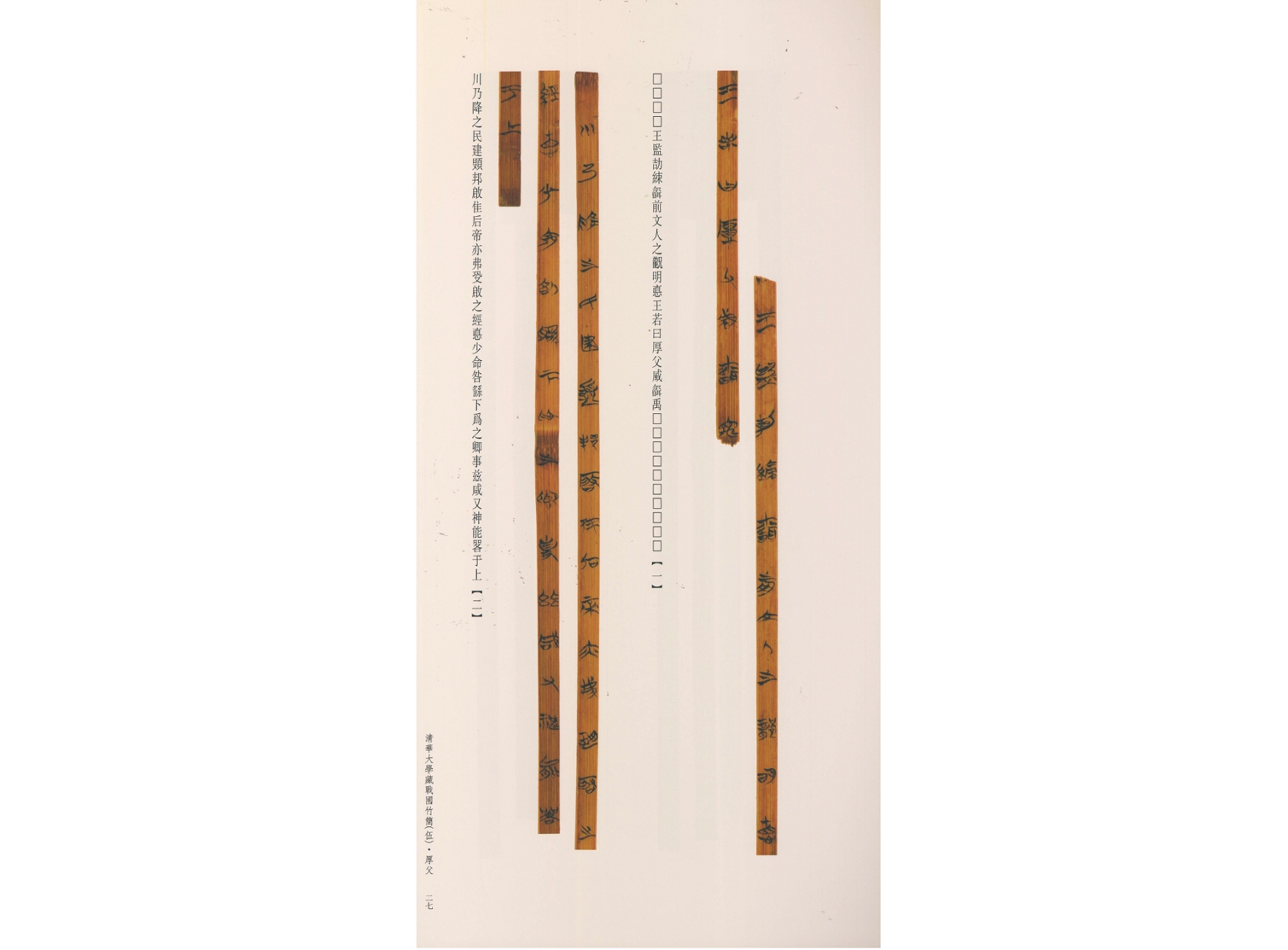Messages from the ancients
From multiple poems never included in The Book of Songs to the oldest known Chinese mathematical texts, many ancient works have resurfaced from fragments of bamboo slips dating back more than two millennia. By year's end, a new book is set to be published containing newly decoded texts detailing the ancient Chinese practices of horse evaluation, treatment, and training.
These texts are part of the Tsinghua bamboo slips, a rich collection of manuscripts from the Warring States period (475-221 BC) acquired by Tsinghua University in July 2008. The trove is comprised of more than 70 ancient works, over 60 of which had been lost for more than 2,000 years. Covering a wide array of subjects, including philosophy, history, astronomy, law, mathematics, and medicine. These texts offer invaluable insights into early Chinese civilization.
"The Tsinghua bamboo slips present a comprehensive collection that offers important historical evidence and intellectual resources for understanding ancient China," Huang Dekuan, a leading scholar involved in the Tsinghua project, told the Global Times.
Currently, the collation work on the thousands of Tsinghua bamboo slips is nearing completion. How are scholars able to reconstruct coherent texts from these fragile slivers of history? And what challenges do they face in bringing long-silent voices to life?

Tsinghua bamboo slips Photo: Courtesy of Tsinghua University's Research and Conservation Center for Unearthed Texts
Unlocking the past
To make 2,000-year-old bamboo slips - fragile, often incomplete, and inscribed with ancient, faded, and arcane characters - "speak" again is no easy task.
The first challenge is reconstructing the texts. These massive slips, largely unnumbered and without titles, arrived scattered and jumbled - many reduced to fragments and without any clear sequence. Researchers need to match slips with corresponding documents and then piece them together, slip by slip, in a scholarly form of high-stakes puzzle-solving.
Then came the more formidable task: Deciphering the script. Written in the state of Chu Warring States era script, many characters had never been seen in any surviving texts, with some making their debut in known history. Even after identifying some characters, understanding their meaning requires extensive research, as only a small number can be cross-referenced with extant classical works.
Jia Lianxiang, a professor at Tsinghua University's Research and Conservation Center for Unearthed Texts, described his intense dedication to Tsinghua bamboo slips research, consuming almost every moment outside of eating, sleeping, and teaching.
Yet pure dedication is not enough. The work also required a fusion of disciplines: paleography, linguistics, philology, history, science, and even art.
Despite the challenges, the rewards are profound, both intellectually and emotionally. "Behind each bamboo slip lies a vivid individual from over 2,000 years ago. Engaging with their thoughts is a true pleasure," said Huang.
He noted that some passages are written in a smooth, flowing hand, suggesting the scribe's confident, even joyful state of mind. "Though the bamboo slips appear lifeless, between the lines, you can still feel the heartbeat and warmth of the people who wrote them."

Researchers carry out preliminarily sorting of the bamboo slips at Tsinghua University. Photo: Courtesy of Tsinghua University's Research and Conservation Center for Unearthed Texts
Ancestral wisdom
In Volume 13, Huang points to a set of 17 slips from the text. "Everyone assumes punctuation is a modern invention," he said. "But here we see clear evidence of its use more than 2,000 years ago." These marks on the slips, he explains, helped ancient readers grasp the structure and meaning of complex arguments.
Two texts, Wuyin tu and Yue feng, are considered to be the most important pre-Qin (221BC-206BC) musical manuscripts discovered since the famed Zenghouyi chime bells.
"The shortest bamboo slip in Yue feng is less than 10 centimeters long, making it the shortest known Warring States period bamboo manuscript," Jia told the Global Times. "It can be considered a 'pocket-sized' bamboo book, and it has expanded scholarly understanding of ancient book formats, transmission, and use."
According to Jia, its compact form made it easy to carry and handle, likely serving a practical function, perhaps similar to today's notecards or autograph books.
The slips also include discovered materials which identify Xia Qi as the "King of All Under Heaven," offering solid support affirming China's 5,000-year civilization and addressing some doubts surrounding the historical existence of the Xia Dynasty (2070BC-1600BC)," an associate professor at the center, Cheng Hao said. The Xia Dynasty is China's earliest known dynasty.
Now, the forthcoming publication, The Tsinghua University Warring States Bamboo Manuscripts (Volume 15), will delve specifically into early Chinese horse culture, and will include materials predating any currently known historical records on the subject, said Huang.
According to Huang, horses, as a vital productive force in ancient times, were closely tied to people's lives, social governance, and national prosperity. "In the Tsinghua bamboo slips, the ancients linked 'managing horses' with 'governing a state,' exploring how to rule effectively. These texts offer valuable insights into early Chinese ideas on governance."
From statecraft to ethics, many slips advocate values such as benevolent rule, moral governance, meritocracy, non-aggression, frugality, and a harmonious relationship between humanity and nature. Though most are only about 0.6 centimeters wide, they carry the weight of ancient reflections — some insights that still resonate today.
In recent years, the Tsinghua research team has been making active efforts to bring these ancient texts to wider audiences, especially the younger generation, from helping develop related television programs and publishing general-interest books (including foreign language editions) to offering elective courses and curating public exhibitions.
"Who are we, where do we come from, and where are we going? Sometimes, the answers lie in the bamboo." "The bamboo slips carry the genes and lifeblood of the Chinese nation." Huang was deeply gratified to see such comments from viewers and readers, as it shows that the rich cultural legacy is finding its way into more minds.
Source: Global Times

